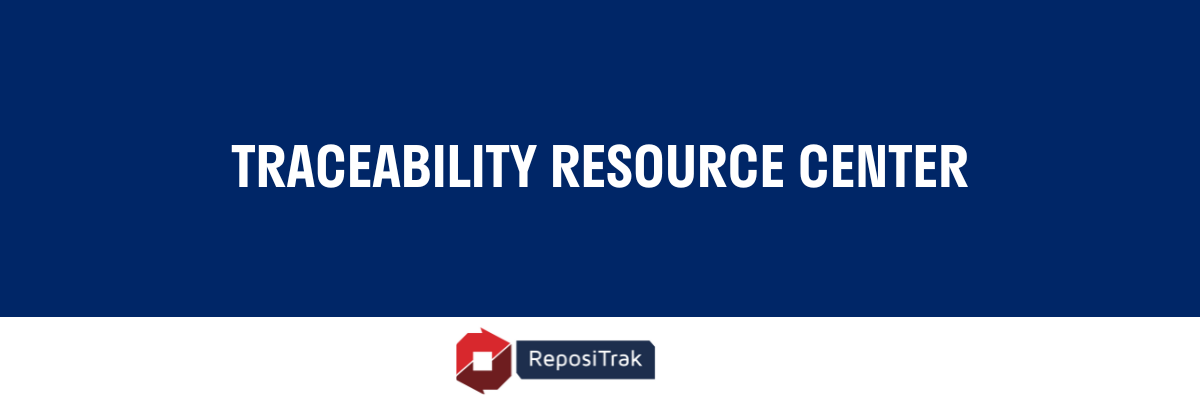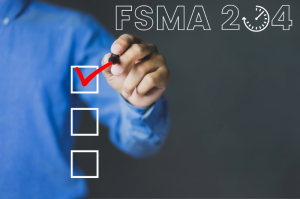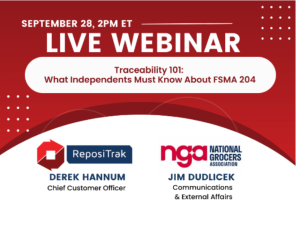
The FDA’s final rule on traceability – the Food Safety
Modernization Act Section 204(d) or FSMA 204 – is now the law. Are you prepared?
FSMA 204 has changed the records management requirements of
every shipment and delivery for every food store, supplier, restaurant, foodservice operation, restaurant
and distribution company in the country. Passed into law in January 2023, FSMA 204 is part of the FDA's
broader New Era of Smarter Food Safety Blueprint, a forward-focused initiative whose primary pillar is
"tech-enabled traceability.”
It will take time for your company to adopt new technology and change
processes to fully implement end-to-end traceability. ReposiTrak is here to help NGA members to make
the switch. We’re doing traceability with thousands of retail stores, suppliers and distribution centers
now, while others are only talking about it. And we’re the only solution that’s backed by the industry as
the lowest-cost and easiest-to-adopt solution.
Who is responsible for food
traceability?
Companies that “manufacture, process, pack or hold” foods on the Food Traceability List (FTL)
are now required to capture and exchange numerous data points called Key Data Elements (KDEs), for
each Critical Tracking Event (CTE) in a product's journey from its point of origin to the end consumer. The
FDA has indicated that the FTL will be a starting point and is expected to grow over time. Some retailers
have made the decision to track more than just FTL foods.
What is a KDE and where does it
come from?How much food traceability information needs to change hands?
For an average 15-store retailer receiving three deliveries per week
with 50 SKUs per load, the number of KDEs required for each CTE equals 117,000 records in one year.
The FDA requires food traceability data to be stored for two years and to
be retrievable within 24 hours upon request – an impossible task without the right technology.
What is a KDE and where does it
come from?What is a KDE and where does it come from?
KDEs or Key Data Elements are specific types of information required
by the FDA to accompany shipments, deliveries or transformation events of products on the FTL. The
FDA has defined a specific set of KDEs for each CTE.
- Traceability Lot Code
- Commodity and, if applicable, variety of the food received
- Quantity and unit of measure of the food received and date of receipt
- Location description for the farm where the food was harvested/cooled/transformed
- Date of harvesting
- Reference document type or number
- New Traceability Lot Code for new food produced in a production, commissary or central
kitchen-type facility - Product description for new or transformed food
- Date of shipment
- Date of receipt
- Location description for the immediate subsequent recipient (other than a transporter) of the
food
Commmon KDEs from various CTEs include:
KDEs are often spread across multiple documents and electronic
systems used for ordering, shipping and receiving. For example, an ASN might contain the name and
address of a supplier, but the lot code might only appear on an invoice or packing slip. The ReposiTrak
Traceability Network synchronizes KDEs from multiple documents or systems into the readable format
the FDA needs.
What are CTEs?
CTEs or Critical Tracking Events refer to the nodes of the food supply
chain where food changes hands or changes form. The CTEs outlined in FSMA 204 include:
harvesting, cooling, initial packing of raw agricultural commodities, first land-based receiving,
transforming, receiving and shipping
When is the compliance deadline
for FSMA 204?
January 20, 2026.
What is a Traceability Lot Code or
TLC?
The Traceability Lot Code is an alphanumeric descriptor used to identify
a traceability lot or batch of product that is covered on the FTL. The TLC is assigned at a "source” CTE
early in the product's lifecycle such as the initial packing, first land-based receiving or transforming CTEs.
TLCs provide the FDA with access to the location description and source information. As the product
changes hands or changes form, the TLC is used to link KDEs together
What is the ReposiTrak
Traceability Network®?
The ReposiTrak Traceability Network is the world’s largest operating
food traceability network, built upon an already-connected network of more than 110,000 individual
supplier facilities, making the onboarding process faster and easier for retailers. The solution is scalable
for the total food supply chain, without the need for new hardware, software or even labeling systems.
There is no cost for retailers and suppliers can connect to an unlimited
number of customers and begin sharing data for a low, flat fee.
The ReposiTrak Traceability Network meets and exceeds FSMA 204 requirements and
opens the door to a safer food supply chain, better operational transparency and faster, more precise
recalls.
Contact Us today: Contact Us – ReposiTrak
Everything you need to know about the ReposiTrak Traceability Network ®
Are consumers calling for more food traceability?
The critical need for enhanced food traceability in the wake of massive beef recall
3 ways FSMA 204 is transforming the nut butter industry – A case study
The CEO’s checklist for the January 2026 FSMA 204 compliance deadline
Morning News Beat: MNB in Conversation: ReposiTrak and The Acheson Group (TAG) Bring Clarity to FSMA Rule 204
What produce suppliers need to know about food traceability, and why labels just won’t work
Why your QA/QC team can’t do traceability alone
>The CEO’s checklist for the January 2026 FSMA 204 compliance deadline
What the FDA isn’t telling you about traceability for nut butters
FSMA 204: What It Is and What You Can Do to Be Compliant
ReposiTrak’s Derek Hannum joined the government relations and food safety teams from the National Grocers Association to talk about compliance with the new traceability requirements and solutions for simplifying that task.
Watch the Webinar: Traceability 2022 – FSMA 204 What the Industry Needs to Know
Jennifer Crandall, founder and CEO of Safe Food En Route, joined Paul Damaren, executive partner at ReposiTrak days after the final rule on FSMA 204 was published, to discuss the impact of the new regulation on food manufacturers, processors, retailers, wholesalers, foodservice and other companies.
Watch the webinar: What Independents Must Know About FSMA 204
Food safety and transparency are paramount in the grocery industry. To that end, Section 204 of the FDA’s Food Safety and Modernization Act, requiring retailers and wholesalers to comply with traceability procedures, will soon take effect.
Traceability for Retailers and Wholesalers
Turn what could become a recordkeeping nightmare into an opportunity to be ready for what the FDA needs and beyond.
Traceability for Suppliers
Your retail and wholesale trade partners will require traceability data their way, in order to meet FDA requirements. Are you ready to comply?
Is it already too late to take on traceability?
That’s a question not enough leaders in grocery retail are asking. The FDA’s landmark food traceability act will be finalized in November 2022, with a 2-year window to prepare. Is that enough time for you to modify the workflow and systems at your…
Why more traceability is better
Gathering, creating and sharing key data elements (KDEs) for critical tracking events (CTEs) in the 16 required categories doesn’t have to be a headache…
FDA Resources: Food Safety Modernization Act Section 204(d)
Read about the food traceability regulation, which Critical Tracking Events and Key Data Elements apply to you, what’s on the Food Traceability List, and more – directly from the source.


















![Its-Almost-Too-Late[81]](https://www.nationalgrocers.org/wp-content/uploads/2022/09/Its-Almost-Too-Late81-300x300.jpeg)

